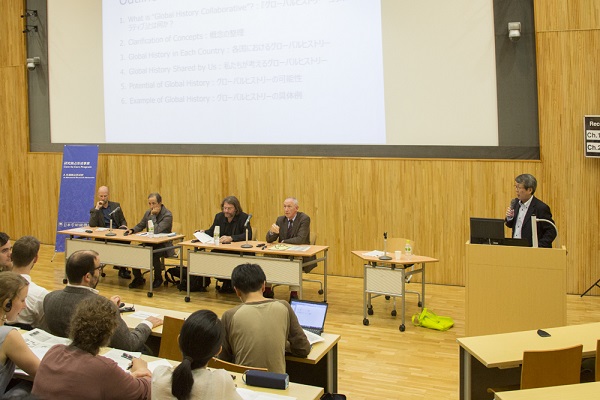2015.10.02
「グローバルヒストリーの可能性」フォーラム(9月9日)GHC Forum "The Potential of Global History"(Sep. 9 2015)
「グローバルヒストリーの可能性」シンポジウム
■日時: 2015年9月9日(水) 16:30~18:30
■会場: 東京大学 情報学環 福武ホール
第1回GHCサマースクール・プログラムの一環として、2015年9月9日の午後、「グローバルヒストリーの可能性」と題するシンポジウムが開催された。グローバルヒストリー共同研究コンソーシアムに参加する各研究機関から、Jeremy Adelman(アメリカ・プリンストン大学)、Alessandro Stanziani(フランス・国立社会科学高等研究院)、Andreas Eckert(ドイツ・フンボルト大学ベルリン)、Sebastian Conrad(ドイツ・ベルリン自由大学)、羽田正(日本・東京大学)の5名の研究者がシンポジウムに登壇した。
シンポジウムでは まず、羽田教授から「グローバルヒストリー共同研究プロジェクト」についての紹介と、英語での「world history」と「global history」の違い、そして日本語の「グローバルヒストリー」と「新しい世界史」といった関連する用語の相違点が説明された。次に、この「global history」という新しい分野について各講演者がアメリカ、フランス、ドイツなどそれぞれが研究拠点にしている各国における展開の近況を報告した。また、現在、世界が直面している移民、気候変動、歴史教育の問題や、国際的な学術界において英語が公用語として定着しつつある現状が、今日のグローバルヒストリーへの関心の高まりの背景として述べられた。
その後、グローバルヒストリー研究の意義について議論がおこなわれた。そこでは、これまでの歴史研究において基本的な枠組み・前提となってきた一国史研究、地域研究、また中心主義的な歴史観などについて再考するために、グローバルヒストリーが挑戦的かつ有益なアプローチであることが述べられた。これは、例えば各国史が不必要であることを意味しているのでは決してなく、分析の単位・対象・地域・用語をできる限り広い文脈で捉えなおすことで、歴史研究に新たな意義をもたせることである。また、知識の生産における歴史性と政治性という課題にとりくむためには、様々な分野の専門家との対話、そして各国史研究を行っている歴史家との協働作業が不可欠であることが指摘された。
シンポジウムの終盤では、グローバルヒストリーの研究の可能性についてさらに意見交換が行われた。グローバルヒストリーという「ツール」をこれからどのように社会に活用することができるか、なぜグローバルヒストリーが必要とされているのか、そして社会において歴史や歴史家がどのような役割を期待されているかについて討論が行われた。このテーマは聴衆との公開討論においても引き継がれた。
シンポジウムに続いて東京大学山上会館にてレセプションが催された。歓迎の辞として、園田茂人教授(東京大学国際本部副本部長)は人文・社会科学分野における協同研究の意義を強調し、特に若い研究者にインスピレーションと発表の場を提供することの重要性について述べられた。東洋文化研究所の高見澤磨所長によって会議の成功を祝した乾杯の音頭がとられた後、GHCサマースクール参加者のみならず、多くの研究者や東京大学の関係者による対話とネットワークづくりが行われた。(文責:金知允 Jiyoon KIM)
”The Potential of Global History” Symposium
September 9 (Wed) 16:30-18:30
Fukutake Hall, University of Tokyo
On the late afternoon of September 9, 2015, the roundtable-style symposium was held with the title of “The Potential of Global History” (「グローバル・ヒストリーの可能性」) as a part of the 1st GHC Summer School program. Five leading scholars in Global History Collaborative Consortium – Jeremy Adelman (Princeton University, USA), Alessandro Stanziani (EHESS, France), Andreas Eckert (Humboldt-Universität zu Berlin, Germany), Sebastian Conrad (Freie Universität Berlin, Germany), and HANEDA Masashi (University of Tokyo, Japan) – joined this forum as main speakers and shared their idea and experience in investigating the question of “Global History” so as to raise the issues to think about.
The themes covered are as following: what “Global History Collaborative” is, clarification of concepts, global history in each country, global history shared by us, the potential of global history, and examples of global history. Prof. Haneda, after giving an introduction of Global History Collaborative project, opened the discussion by proposing to re-consider the differences among the relevant concepts, namely, world history, global history (in English), グローバル・ヒストリー(global history in Japanese) and 新しい世界史 (new world history in Japanese). Each speaker first gave a general background in terms of the development and the recent situation of this challenging field in each country that indeed is connected to the contexts including academic traditions and temporal concerns both in each society and a broader world. The problems of migration, environmental climate change, history education, and English as the official academic language, for example, were brought up as factors that influenced the increased interest in the entanglement and global history.
Then the talks moved toward the discussion on the meaning of global history and its challenge upon national historiography, area studies, and any kind of centrism: in other words, Global History as a method and perspective. It helps to reflect on and modify fundamental premises. This does not necessarily mean to discard nation-states, but rather, it relates to locating and problematizing units, objects, regions, and terms in a larger and open context so as to go beyond the hegemony in academia and the hierarchy in the world. History and politics of knowledge production herein is another thing to think about. The conversation with different kinds of expertise and participation from mainstream historians will be necessary.
The last part of symposium was a more open-ended ideation on what we need to do with the tool of global history. The potential of global history is associated with the reason why we need global history today as well as the roles of history and (global) historians in the current world. This topic was continued in the open discussion with the audience. The importance of collaborative works, critical engagement, movements to make counter-effects, democratization of knowledge, the revision of national history and new identity such as “earthman/earthwoman”, once again were highlighted as possible strategies.
The reception at Sanjo Conference Hall in University of Tokyo was followed after the symposium. ,Prof. SONODA (Deputy Director General, Division of International Affairs, Univerity of Tokyo) in his welcome remarks, put emphasis on the significance of this kind of collaborative works in the field of Humanities and Social Sciences, which could provide inspiration and a platform especially for young researchers. Prof.TAKAMIZAWA (Director of the Institute of Advanced Studies on Asia, University of Tokyo) proposed a toast to celebrate the event. Not only the participants of GHC Summer School, but also numerous researchers as well as faculty members of University of Tokyo joined the banquet and continued dialogues and networking.
(KIM Jiyoon)

















